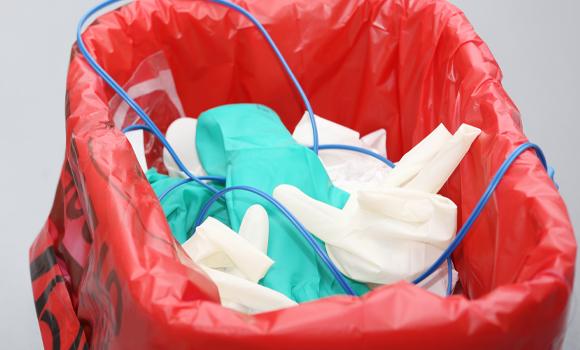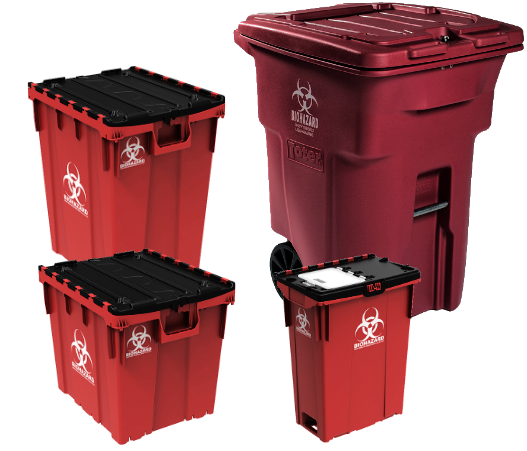Competence Let Loose: Grasping the Art of Medical Waste Removal for Health Facilities
Competence Let Loose: Grasping the Art of Medical Waste Removal for Health Facilities
Blog Article
Discovering Various Waste Disposal Options for a Cleanser Setting
In the pursuit of a cleaner environment, the monitoring of garbage disposal has become an important centerpiece for sustainable development. With a plethora of garbage disposal choices readily available, ranging from conventional landfill methods to cutting-edge waste-to-energy modern technologies, the option of exactly how we handle our waste has far-reaching effects for our earth's health. By taking a look at the numerous techniques and strategies employed in reusing, composting, incineration, landfill monitoring, and waste-to-energy processes, a deeper understanding of their effects and performance can be gained. The pursuit for optimal waste disposal approaches that focus on ecological conservation while meeting the needs of a growing population continues to be a pushing concern in today's globe.
Recycling Approaches
Implementing effective recycling approaches is important in lessening waste and promoting sustainability in our setting. Recycling includes the procedure of converting waste products right into multiple-use challenge prevent unnecessary disposal. One of one of the most common recycling techniques is worldly healing, where materials like paper, plastic, metal, and glass are collected, arranged, and refined to create new items. This process not just conserves natural sources however additionally decreases energy consumption and greenhouse gas emissions related to producing new products from scrape.
Another essential recycling method is composting, which includes decomposing natural waste like food scraps and backyard trimmings right into nutrient-rich dirt. By incorporating these different reusing methods into our waste management techniques, we can dramatically reduce our environmental impact and move towards a much more sustainable future.

Composting Methods
Effective waste management methods, such as recycling methods, lead the way for a cleaner setting, and currently, moving the focus to 'Composting Techniques', we explore lasting ways to break down organic waste for ecological advantage. medical waste removal service.
Composting is an all-natural procedure that changes natural waste, like food scraps and yard trimmings, right into a nutrient-rich soil change. The key to effective composting exists in producing the best balance of environment-friendly products, such as fruit and vegetable scraps, and brown products, like dried twigs and fallen leaves. These materials decay with the assistance of microbes, breaking down the waste into beneficial garden compost.
Typical backyard composting entails layering organic materials in a bin or stack and consistently transforming the mixture to freshen it. By making use of composting techniques, we can minimize the quantity of waste sent out to land fills while producing a beneficial product for enriching soil and supporting plant growth.
Incineration Cons and pros
Incineration, as a waste disposal approach, provides both benefits and negative aspects that merit mindful consideration in the world of sustainable waste monitoring practices. On the positive side, incineration can substantially decrease the volume of waste, lessening the demand for land fill space and possibly reducing greenhouse gas discharges.
Nevertheless, there are noteworthy disadvantages to incineration. One major issue is the possible launch of dangerous contaminants right into the air, such as dioxins, click here hefty steels, and particulate issue, which can have unfavorable impacts on human health and the environment. Furthermore, the high first investment and functional expenses of incineration facilities position economic challenges, making it a less economical choice contrasted to various other waste administration strategies. Cautious tracking and policy are vital to mitigate these negative impacts and optimize the benefits of incineration as part of an extensive waste monitoring method.
Land Fill Administration Methods
Land fills play a crucial duty in waste monitoring and environmental conservation by providing a containment system for the disposal of strong waste materials. Effective landfill administration approaches are important to mitigate ecological effects and make sure the lasting sustainability of these garbage disposal sites. One key approach is proper waste compaction to maximize making use of available area within the garbage dump (click here). By compacting the waste, the volume is minimized, allowing for more waste to be accommodated over time.
Moreover, the application of daily cover methods is crucial in lessening odors, stopping trash, and minimizing the attraction of insects. Covering the disposed waste at the end of every day helps to include odors and prevent possible ecological contamination. Furthermore, the monitoring of landfill gas discharges and leachate levels is critical in guaranteeing that environmental standards are fulfilled and that any kind of prospective dangers to surrounding ecological communities are minimized.

Waste-to-Energy Technologies
One of the ingenious strategies to squander administration involves utilizing Waste-to-Energy modern technologies to transform strong waste into usable power resources. Waste-to-Energy (WtE) innovations encompass a range of processes that intend to draw out energy from waste products through thermal, chemical, or organic means. This conversion procedure not only decreases the volume of waste that finishes up in land fills yet likewise generates important power resources such as power, warmth, or biofuels.
There are a number of techniques of Waste-to-Energy conversion, consisting of pyrolysis, incineration, and gasification. Incineration involves melting waste at high temperature levels to create warmth and electrical power. Gasification transforms waste right into a syngas, which can be made use of for power generation or chemical manufacturing. Pyrolysis breaks down organic materials using high temperatures in the lack of oxygen, producing bio-oil, char, and gas.
Applying Waste-to-Energy modern technologies can aid mitigate ecological problems connected with standard garbage disposal methods while all at once providing a renewable energy source. Careful consideration needs to be offered to discharges control and making sure the sustainability of feedstock supplies for these modern technologies to be genuinely useful for a cleaner environment.

Verdict
Finally, checking out numerous garbage disposal alternatives such as reusing, composting, incineration, garbage dump management, and waste-to-energy technologies is necessary for advertising a cleaner setting - click here. Each technique has its own benefits and challenges, but by using a combination of these strategies, we can function towards decreasing the quantity of waste that winds up in garbage dumps and eventually add to a much more sustainable future for generations to find
With a multitude of waste disposal alternatives readily available, ranging from typical landfill approaches to innovative waste-to-energy technologies, the option of just how we handle our waste has far-reaching implications for our world's health. medical waste removal.Incineration, as a waste disposal technique, presents both advantages and drawbacks that warrant mindful factor to consider in the realm of lasting waste management techniques.Landfills play an essential role in waste management and environmental preservation by offering a control system for the disposal of solid waste products. By condensing the waste, the volume is minimized, enabling for more waste to be suited over time
One of the innovative methods to waste management includes harnessing Waste-to-Energy modern technologies to convert solid waste into useful power sources.
Report this page